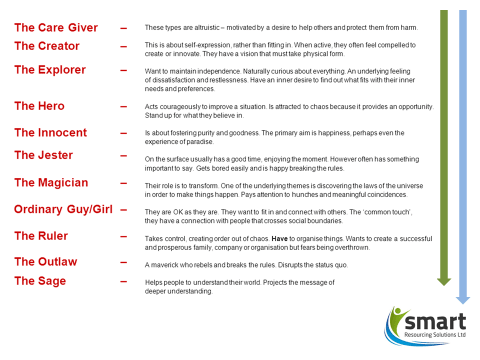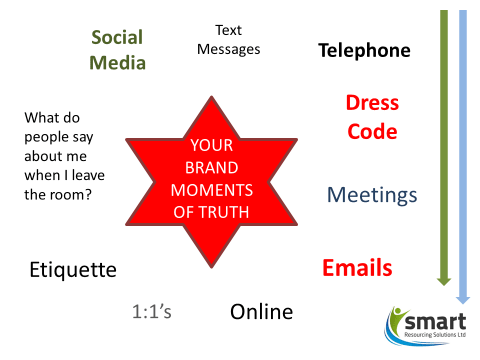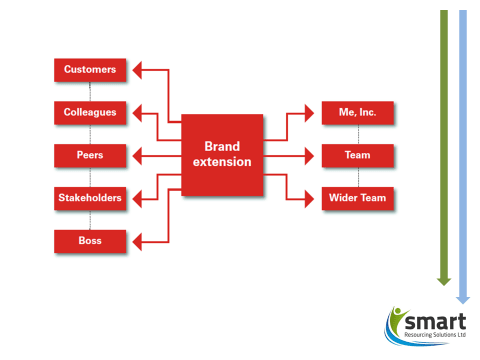Are you good at what you do? Is that good enough? If you were through to an assessment centre for the employer of your dreams, could you differentiate yourself as outstanding? As better than the rest? What do you stand for? If you can’t clearly answer these questions then it’s time to define your personal brand.
The Oxford Dictionary definition of brand is a product name or livestock branding. The former is more relevant in this context. Brands can be difficult to define and also difficult to replicate so get yours right and it will be a valuable USP.
Brands make a promise to their customers. Duracell promise a longer lasting battery, Bounty promises a taste of paradise and Lloyds TSB promise to be with you for the journey. However, brands aren’t just about a logo, advertising, packaging and company literature. Brands are the sum of all experiences that a person has of a product or service.
So how does this relate to people?
Well, people are a lot like brands: the information you receive + values you hold = your perception. If brands are not understood, not cared for and not treated with respect, they can cause a lot of damage.
“Right now, this minute you have a brand. It might be spot on with the goals and visions you have for yourself or it may differ widely. Either way, you’ve cultivated it over a series of interactions and experiences you have had with people”
Peter Montoya – Marketing Executive and author of The Brand Called You
Who are you?

So who are you and what do you stand for? It might be that you firmly fit one of the examples above or are a combination of several types or maybe you need to create a completely new type that accurately reflects who you are. Everyone has their strengths and some strengths are better for certain types of careers than others. For example, I’d rather be treated by a doctor or nurse identified as a Care Giver rather than an Outlaw but I’d love to see what the Outlaw could do in a digital start up.
There are so many opportunities to get your personal branding right. Think about how you currently treat these interactions:

Social media
Most of us use social media. What does your Facebook page say about you? It is often quoted that employers look at the Facebook profiles of potential employees. It is worth ensuring your settings are private so that you can continue to post what you like without worrying. Think about your profile and cover pictures and the image they conjure to someone who knows nothing else about you. I have two separate twitter accounts – one that is professional, @SRS_Sophie, where I talk about things relevant to the graduate recruitment industry and business and one that is personal (and locked) where I talk about whatever I like – usually rubbish TV shows and where I’ve been for dinner!
Dress code
Dress code is an interesting one as it can be very different for various industries. Whilst a smart suit is expected for an interview with an investment bank, if you turned up suited and booted for a role in buying or the media, it might not create the desired impression. Get to know your industry and what the expectations are and then adapt your own style as naturally as you can.
Communication skills
Consider your communication skills with regards to telephone and email and think about what image they project. There is an opportunity to build rapport during these interactions and show your personality but ensure your tone fits the audience. Perhaps you might adopt a slightly different approach with your personal branding when interacting with different audiences.

So what do you want employers to think or feel when they see your personal branding?
When establishing your personal branding template, take time to reflect and think about the following:
- Your Brand Promise – what you stand for
- Your Greatest Strength – what you bring to the employer that will be an asset
- Your Brand Personality – the elements that make up your brand promise
- Your Values – what’s important to you
- Your Differentiators – what makes you unique
The most important thing to remember when considering your personal branding is to be authentic. You can’t pretend to be a certain way because you think that is what the employer wants. They will usually see through it at assessment stage, something won’t feel right or genuine. If you manage to fake your brand to the point of starting a job, chances are not being a genuine fit will mean you don’t enjoy the role or the environment and that is no good for you or the employer. Keep it real!
You are unique and employers want to get to know who you are and what you have to offer. Be confident in what makes you special and use that assessment centre or interview to show an employer exactly why they should pick YOU.
About the Author: Sophie Milliken is Managing Director at Smart Resourcing Solutions, providing employers with assessment design and delivery services, universities with employability solutions and students with application support.
